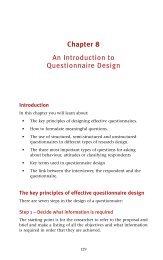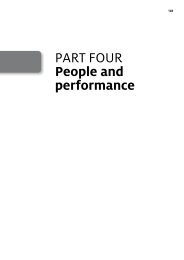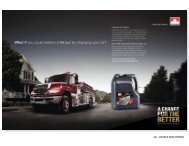The growing business handbook : inspiration and advice ... - Sparkler
The growing business handbook : inspiration and advice ... - Sparkler
The growing business handbook : inspiration and advice ... - Sparkler
You also want an ePaper? Increase the reach of your titles
YUMPU automatically turns print PDFs into web optimized ePapers that Google loves.
Making open innovation work<br />
69<br />
an idea to proof-of-concept stage. In situations where br<strong>and</strong> owners refuse to sign<br />
non-disclosure agreements (in case they impinge upon concepts the owner could<br />
potentially already be working on), originators are totally unprotected from<br />
misappropriation of their propositions by those who believe that all pre-commercialized<br />
or pre-patent ideas are free to use as they choose, regardless of the stage they are at or<br />
the expertise put into formulating them.<br />
Pre-patent concepts, including unprotected designs, 3D applications, service<br />
design, <strong>business</strong> models, propositions <strong>and</strong> processes, are consistently purloined by<br />
others on the basis that ‘ideas cannot be protected’. It is as if some companies believe<br />
<strong>business</strong> meetings are held under a Creative Commons license, which denotes that a<br />
piece of work, code, image or file is open source <strong>and</strong> may be utilized by anyone for<br />
any purpose without requiring permission.<br />
But professional originators’ propositions are tradable knowledge-based solutions<br />
developed by industry experts with requisite know-how – in effect, proprietary but<br />
unprotected information. And these originators do not in the main set up competitive<br />
br<strong>and</strong>s <strong>and</strong> companies, but more often seek to transfer knowledge <strong>and</strong> license<br />
concepts to br<strong>and</strong> owners.<br />
I have personal experience of presenting propositions to organizations under<br />
non-confidential terms in order to enable negotiation to take place under normal<br />
conditions of <strong>business</strong> confidentiality – only for the same organizations to later assert<br />
that such exposure is in the public domain. But public domain is exactly that – ideas<br />
that have been fully exposed on public platforms such as a journal, conference or<br />
website.<br />
It is disingenuous to assert that a one-to-one <strong>business</strong> meeting is in the public<br />
domain. All <strong>business</strong>es are subject to a duty of confidentiality <strong>and</strong> most modern<br />
<strong>business</strong>es have a Corporate Social Responsibility policy in place. <strong>The</strong>y are dutybound,<br />
if not legally constrained, from acting in an unethical manner through the<br />
misappropriation of innovative works brought to them by the owners with the<br />
express intent of negotiating a mutually agreeable purchase of such works.<br />
So where do we go from here?<br />
A new trading model is required that respects proposition ownership <strong>and</strong> value<br />
If open innovation is ever to reach its full potential, a new trading model is<br />
required that respects the ownership <strong>and</strong> value of pre-patent concepts <strong>and</strong> propositions<br />
devised by professional originators <strong>and</strong> described in commercial negotiations with<br />
route-to-market <strong>business</strong>es. Such a trading model needs to be based on unimpeachable<br />
<strong>business</strong> ethics, best professional practice <strong>and</strong> permission-based commercialization.<br />
And it needs to h<strong>and</strong> some semblance of pre-patent IP protection back to the<br />
professional originator.<br />
As noted above, the bad news is that the market cannot rely upon ethics alone. <strong>The</strong><br />
good news is that a new digital barcode system that could prevent the misappropriation<br />
of confidential new ideas <strong>and</strong> proprietary information is to be rolled out. Creative<br />
Barcode denotes ownership of propositions <strong>and</strong> concepts that require the owner’s<br />
permission to exploit them, <strong>and</strong> offers prospective buyers the route to collaboration,








